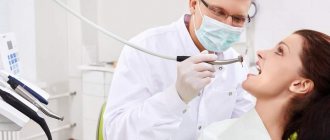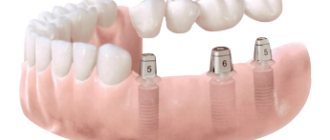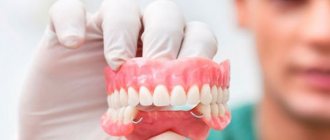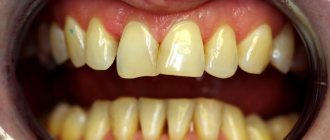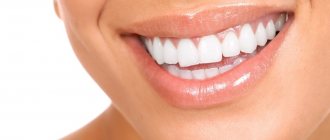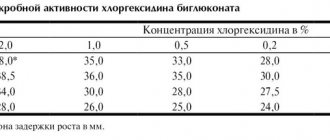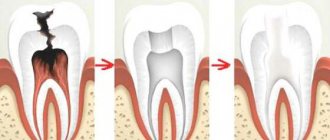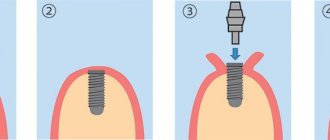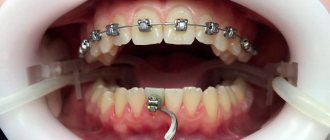Author of the article: Kryukov Andrey Vladimirovich
Chief physician. Doctor-expert
Specialization: Dentist-orthopedist
Total work experience: since 2005
Reading time: 7-8 minutes
Orthopedics in dentistry is a branch of medicine that deals with the restoration of teeth using all modern prosthetic techniques. It is not surprising that an orthopedic dentist is popularly known as a prosthetist. To preserve decaying teeth or restore the attractiveness of your smile, it is important to know with what symptoms you need to go to this specialist, what methods he uses and what results he guarantees.
Degree: Doctor – dentist – orthopedist
The most common entrance exams:
An exam in a core subject may be scheduled at the discretion of the university.
Prosthetic dentistry is a separate branch of dental sciences. Orthopedic dentists are otherwise called prosthetists, and they begin to treat the patient if the dentist-therapist has exhausted all possible methods for treatment.
The current level of development of prosthetics involves the use of many devices and methods by the doctor. These include crowns, bridges, implants, and removable dentures. Thus, modern medicine allows a person to save teeth even in very severe or advanced cases.
Specialization and methods
There are some main areas of specialization of orthopedists from somatology, as well as the methods that they use to perform their tasks.
Among the main directions it is necessary to note:
- Microprosthetics. Involves the production and installation of veneers to straighten the dentition and restore teeth. Veneers are installed, which are platinum, the thickness of which is no more than a millimeter and are intended for installation on the front or cutting surface of the teeth. Inlays are also installed, which are used in case of complete destruction of teeth and are intended for restoration as the basis of the tooth.
- Removable techniques. Used to restore teeth or in complete absence of dentition. They stay on the gums due to suction force.
- Non-removable methods. Bridges are used that are attached to a pre-implanted implant. The same applies to artificial crowns.
Admission conditions
Admission to the specialty 08/31/75 “Orthopedic Dentistry” is possible only with a higher medical education.
Specialists who have graduated from a medical school in the following specialty can apply here:
- pediatrics;
- medical business.
Thus, for admission it will not be enough to know which subjects to take. An exam in a core subject may be scheduled at the discretion of the university.
How to choose a specialist?
The selection of a specialist in the profile under consideration is carried out taking into account some basic components.
Among these are:
- General experience in this area of activity.
- The exact number of successful operations performed.
- Recommendations from colleagues in the workshop.
- The level of the higher educational institution from which the doctor graduated and the nature of practice as of the current moment.
- The level of the price criterion for the total volume of work performed by the doctor.
- Recommendations from patients who have previously sought help from a particular physician.
Future profession
The specialty of an orthopedic dentist requires excellent knowledge of the biomechanics of the dental system. Based on his knowledge, the doctor will be able to offer his patient options, take dental impressions, create dentures or implants, then try them on, make adjustments and finally fix them in the oral cavity.
The future orthopedic dentist will be able to:
- determine the patient’s condition, provide first aid if necessary and refer the patient for hospitalization;
- conduct a complete examination of the patient’s oral cavity, make conclusions about the patient’s mucous membrane, gums, soft tissues and teeth;
- determine the feasibility of various laboratory research methods;
- diagnose dental diseases in people of different ages, justify your diagnosis;
- anesthetize the patient’s mouth and jaws;
- perform prosthetics and dental implantation in the presence of diseases and pathological conditions;
- make splints, spoons, mouthguards and other devices individually in each case;
- Monitor the patient’s condition and complete all medical documentation in accordance with current requirements.
All this knowledge will allow the future orthopedic dentist to provide high-quality dental care to different age groups of patients.
Job Description - Briefly
The job description was developed and approved in accordance with the provisions of the Labor Code of the Russian Federation, its main provisions:
- An orthopedic doctor must know the laws, regulations that regulate the activities of healthcare institutions, methods, rules of care, etc.;
- the specialist is responsible for the proper and timely performance of his duties;
- the employee must have a higher medical education and appropriate training;
- complies with the rules of labor protection, sanitation, safety regulations, and also monitors compliance with the prescribed rules by lower-ranking personnel;
- patient management tactics are established in accordance with established rules and standards;
- provision of medical care using modern diagnostic and treatment methods.
Where to apply
To make training in this specialty possible, it is worth enrolling in the following universities in Moscow and other Russian cities:
- Kuban State Medical University;
- Altai State Medical University;
- St. Petersburg Institute of Dentistry;
- Moscow State Medical and Dental University;
- Ryazan State Medical University;
- Russian Medical Academy of Postgraduate Education;
- Northern State Medical University.
There are many other universities in the Russian Federation that offer training in specialties in this area.
What qualities does an applicant need to have?
The profession of any dentist involves a set of necessary personality qualities that are needed in work and career growth. In their absence, successful performance of job duties is impossible:
- responsibility for the course of treatment;
- being careful to minimize the risk of injury or aggravation of the problem;
- tendency to work with hands, endurance;
- well-developed fine motor skills for carrying out small operations;
- friendliness and sociability.
Specialists continuously improve and expand their qualifications. What makes the specialty of an orthopedic dentist not the easiest. Therefore, applicants must be prepared for a serious approach.
Where to study
In Russia there are many educational institutions where you can get an education in dentistry. There are all comfortable conditions for improving your qualifications, various courses for moving into a related area of practice.
The profession of a medical assistant or nurse can be obtained at a medical college, where testing is carried out upon admission.
Duration of training
The duration of training and the form are closely interrelated. You can study at:
- full-time;
- individual form.
There is no correspondence form for this specialty. For full-time study, the duration will be 2 years, and for individual study, it is set at the discretion of the educational institution. However, it can increase to no more than three years.
Average prices
The cost of services of a specialist in this area is determined by several main factors:
- The method chosen for the work. Implantation using fixation of zirconium dioxide crown is the most expensive. The average cost of such services today is set at 15,000 rubles .
- The total amount of work performed. Depending on the volume of dental units being restored, the total cost of the work is determined. In this case, the cost of manufacturing and installing a bridge varies from 5,000 to 8,500 rubles.
- Material used in manufacturing. The cost of the material is the determining factor in setting the price of the product. A metal crown can cost 1,500 rubles , while a ceramic crown will cost 6,000 or more.
Disciplines studied
During their studies, the student will study the following subjects:
- human anatomy and physiology in the course of biomechanics of the jaw system;
- dental materials science with a labor protection course;
- dental diseases;
- basics of orthopedic dentistry;
- production of removable laminar dentures;
- production of fixed prostheses;
- hygiene and epidemiology of emergency situations;
- examination methods in dentistry;
- organization of health and public health, etc.
A little bit of history
The history of orthopedics goes back a long way. The first prosthetics, made by ancient orthopedic masters 4.5 thousand years ago, were discovered during excavations in Mesopotamia and Ancient Egypt. They used gold wire as a fixation element.
The founder of modern dental orthopedics is considered to be the Frenchman Pierre Fauchard, who wrote the manual “Dental Surgery...”, published in 1728.
Fauchard was responsible for the development of some methods of prosthetics, in particular, fastening prostheses with springs, correcting the position of units with ligatures, and the idea of pin structures.
At first, orthopedists dealt exclusively with prosthetics. But as practice has shown, this alone is not enough to achieve a high-quality and sustainable result.
Modern orthopedics, in addition to prosthetics, includes the diagnosis and prevention of pathologies of the jaw system.
Acquired skills
During the training process, residency offers the future specialist to fully master all the skills necessary for professional activity and consolidate the acquired knowledge in practice. Thus, the future orthopedic dentist will be able to:
- determine how mobile the tooth is;
- establish the condition of the oral mucosa, determine how pliable and mobile it is;
- probe and determine the condition of periodontal pockets;
perform eclectic diagnostics, provide high-quality anesthesia to your patients;- make two-layer or regular impressions of teeth on plaster or elastic masses;
- carry out complete preparation of the patient’s oral cavity for prosthetics, which includes the treatment of diseases of the oral organs;
- prepare the crowns and roots of teeth for the upcoming installation of dentures;
- install plastic, stamped or solid dental crowns, install pin dentures;
- apply splints made of various materials;
- perform aesthetic modeling of future prostheses, etc.
The skills that a resident acquires during the training process allow him to become a qualified specialist.
Reviews
The services of orthopedic dentists are in constant demand. Dental problems (caries, injuries, etc.) require qualified orthopedic care.
An experienced orthopedic dentist will always accept an acceptable option for the method and method of prosthetics and restoration of the dentition.
Sources:
- https://prozubi24.ru/chto-delaet-stomatolog-ortoped/
- https://StomaGet.ru/protezirovanie-i-implantatsiya/stomatolog-ortoped
- https://mnogozubov.ru/ortopedicheskaya-stomatologiya/
- https://www.vash-dentist.ru/protezirovanie/nesemnyie-p/stomatolog-ortoped-delaet-i-chto-lechit-etot-spetsialist.html
- https://dentist-pro.ru/protezirovanie/nesemnye/stomatologa-ortopeda-chto-on-delaet.html
- https://dr-zubov.ru/ortopediya/nesemnye-protezy/chto-delaet-stomatolog.html
- https://lstom.ru/articles/ortoped/
- https://SimptoMer.ru/doctor/ortoped
Benefits of postgraduate study
If a resident does not want to stop there after graduating from university, he can enroll in graduate school. This will allow him to deepen his knowledge and hone his professional skills, as well as devote himself to scientific activities in the future.
Because graduate students gain important teaching and management skills, they greatly expand the types of positions they can take upon completion of their studies. Graduate students are more in demand on the Russian labor market, which guarantees their successful employment.
The profession of a dental prosthetist involves pros and cons in the work. Among the advantages:
- relevance - people have problems, dental diseases;
- prospect - possible career growth, transition to a related profession;
- flexible work schedule - you can work at a time that suits you;
- high wages are due to the growth of private dental clinics that need doctors.
Among the disadvantages:
- requirements for the profession - necessary personality qualities, skills that not everyone has;
- duration and complexity of training;
- mastering technologies, continuous training.
Before enrolling in training in this area, you should carefully, slowly, consider the positive and negative aspects. To build a successful career, desire alone will not be enough.
Career
in the same position throughout his work history , but, as his skills improve (and move to different clinics), his income increases. Or he can become the head of the department, then, after some time, receive the position of deputy chief physician of the clinic, and then become the chief physician . A faster option for this career advancement has already been mentioned - this is opening your own medical institution, but it will require financial investments and the solution of many organizational issues. With a focus on research and development, an orthopedic dentist can become a candidate, and then a doctor of science .
